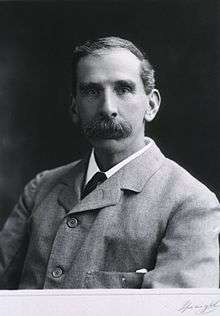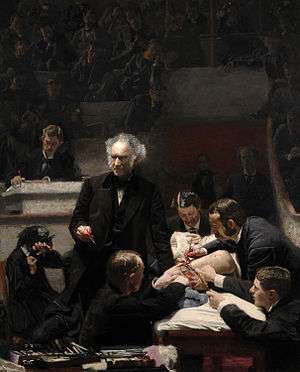Surgeon

In medicine, a surgeon is a doctor who performs operations. Surgeons may be physicians, podiatrists, dentists, or veterinarians.
History

The first person to document a surgery was the the 6th Century BC Indian physician-surgeon, Sushrutha. He specialised in cosmetic plastic surgery and had documented even an operation of open rhinoplasty[1] His magnum opus Suśruta-saṃhitā is one of the most important surviving ancient treatises on medicine and is considered a foundational text of Ayurveda and surgery. The treatise addresses all aspects of general medicine, but the translator G. D. Singhal dubbed Suśruta "the father of surgical intervention" on account of the extraordinarily accurate and detailed accounts of surgery to be found in the work.[2]
After the eventual decline of Sushruta School of Medicine in India, surgery had been largely ignored until the Islamic Golden Age surgeon Al-Zahrawi (936-1013), reestablished surgery as an effective medical practice. He is considered the greatest medieval surgeon to have appeared from the Islamic World, and has been described as the father of surgery.[3] His greatest contribution to medicine is the Kitab al-Tasrif, a thirty-volume encyclopedia of medical practices.[4] He was the first physician to describe an ectopic pregnancy, and the first physician to identify the hereditary nature of haemophilia.[5]
His pioneering contributions to the field of surgical procedures and instruments had an enormous impact on surgery but it was not until the nineteenth century that surgery as a distinct medical discipline emerged in Europe and the Western world..[5]
In Europe, surgery was mostly associated with barber-surgeons who also used their hair-cutting tools to undertake surgical procedures, often at the battlefield and also for their royal paymasters. With advances in medicine and physiology, the professions of barbers and surgeons diverged; by the 19th century barber-surgeons had virtually disappeared, and surgeons were almost invariably qualified doctors who had specialized in surgery. Surgeon continued, however, to be used as the title for military medical officers until the end of the 19th century, and the title of Surgeon General continues to exist for both senior military medical officers and senior government public health officers.
Titles in the Commonwealth
In 1950, the Royal College of Surgeons of England (RCS) in London began to offer surgeons a formal status via RCS membership. The title Mister became a badge of honour, and today, in many Commonwealth countries, a qualified doctor who, after at least four years' training, obtains a surgical qualification (formerly Fellow of the Royal College of Surgeons, but now also Member of the Royal College of Surgeons or a number of other diplomas) is given the honour of being allowed to revert to calling themselves Mr, Miss, Mrs or Ms in the course of their professional practice, but this time the meaning is different. It is sometimes assumed that the change of title implies consultant status (and some mistakenly think non-surgical consultants are Mr too), but the length of postgraduate medical training outside North America is such that a qualified surgeon may be years away from obtaining such a post: many doctors used to obtain these qualifications in the senior house officer grade, and remain in that grade when they began sub-specialty training. The distinction of Mr (etc.) is also used by surgeons in the Republic of Ireland, Australia, Barbados, New Zealand, South Africa, Zimbabwe, and some other Commonwealth countries.[6]
Military titles
In many English-speaking countries the military title of surgeon is applied to any medical practitioner, due to the historical evolution of the term.
Specialties
- Cardiac surgery (in the United States considered part of cardiothoracic surgery)
- Colon and rectal surgery
- Dental surgery
- Transplant surgery
- Upper gastrointestinal surgery
- Vascular surgery
- Craniofacial surgery
- Neurological surgery
- Oral and maxillofacial surgery
- Obstetrics and gynaecology
- Orthopedic surgery
- Ophthalmology
- Otorhinolaryngology
- Pediatric surgery
- Plastic surgery
- Podiatric surgery
- Surgical oncology
- Trauma surgery
- Thoracic surgery (in the United States considered part of cardiothoracic surgery)
- Urology
- Veterinary surgery
- General Surgery
Some physicians who are general practitioners or specialists in family medicine or emergency medicine may perform limited ranges of minor, common, or emergency surgery. Anesthesia often accompanies surgery, and anesthesiologists and nurse anesthetists may oversee this aspect of surgery. Surgeon's assistant, surgical nurses, surgical technologists and operating department practitioners are trained professionals who support surgeons.
In the United States, the Department of Labor description of a surgeon is "a physician who treats diseases, injuries, and deformities by invasive, minimally-invasive, or non-invasive surgical methods, such as using instruments, appliances, or by manual manipulation".[7]
Pioneer surgeons


- Sushruta (the first to document an operation of open rhinoplasty[8])
- Abu al-Qasim al-Zahrawi (considered the father of modern surgery,[9])
- Charles Kelman (Invented phacoemulsification, the technique of modern cataract surgery)
- William Stewart Halsted (initiated surgical residency training in U.S., pioneer in many fields)
- Alfred Blalock (first modern day successful open heart surgery in 1944)
- C. Walton Lillehei (labeled "Father of modern day open heart surgery")
- Christiaan Barnard (cardiac surgery, first heart transplantation)
- Victor Chang Australian pioneer of heart transplantation
- John Hunter (Scottish, viewed as the father of modern surgery, performed hundreds of dissections, served as the model for Dr. Jekyll.)
- Sir Victor Horsley (neurosurgery)
- Lars Leksell (neurosurgery, inventor of radiosurgery)
- Joseph Lister (discoverer of surgical sepsis, Listerine named in his honour)
- Harvey Cushing (pioneer, and often considered the father of, modern neurosurgery)
- Paul Tessier (French Surgeon, Father of Craniofacial surgery)
- Gholam A. Peyman (Inventor of LASIK,[10])
- Ioannis Pallikaris (Greek surgeon. Performed the first LASIK procedure on a human eye.[11] Developed Epi-LASIK.[12])
- Nikolay Pirogov (the founder of field surgery)
- Valery Shumakov (pioneer of artificial organs implantation)
- Svyatoslav Fyodorov (creator of radial keratotomy)
- Gazi Yasargil (Turkish neurosurgeon, founder of microneurosurgery)
- Rene Favaloro (first surgeon to perform bypass surgery)
- Michael R. Harrison (pioneer of fetal surgery)
- Michael DeBakey (educator and innovator in the field of cardiac surgery)
- Fidel Pagés (pioneer of epidural anesthesia)
Organizations and fellowships
| Wikimedia Commons has media related to Surgeons. |
References
- ↑ Ira D. Papel, John Frodel, Facial Plastic and Reconstructive Surgery
- ↑ Singhal, G. D. (1972). Diagnostic considerations in ancient Indian surgery: (based on Nidāna-Sthāna of Suśruta Saṁhitā). Varanasi: Singhal Publications. line feed character in
|title=at position 45 (help) - ↑ Ahmad, Z. (St Thomas' Hospital) (2007), "Al-Zahrawi - The Father of Surgery", ANZ Journal of Surgery, 77 (Suppl. 1): A83, doi:10.1111/j.1445-2197.2007.04130_8.x
- ↑ al-Zahrāwī, Abū al-Qāsim Khalaf ibn ʻAbbās; Studies, Gustave E. von Grunebaum Center for Near Eastern (1973). Albucasis on surgery and instruments. University of California Press. ISBN 978-0-520-01532-6. Retrieved 16 May 2011.
- 1 2 Cosman, Madeleine Pelner; Jones, Linda Gale (2008). Handbook to Life in the Medieval World. Handbook to Life Series. 2. Infobase Publishing. pp. 528–530. ISBN 0-8160-4887-8.
- ↑ "Patients: The Surgical Team: Qualifications of a surgeon". Royal College of Surgeons of England. Retrieved 13 June 2015.
- ↑ "Occupational Employment Statistic: Occupational Employment and Wages, May 2015: 29-1067 Surgeons". www.bls.gov. Retrieved 2016-04-26.
- ↑ Ira D. Papel, John Frodel, Facial Plastic and Reconstructive Surgery
- ↑ A. Martin-Araguz, C. Bustamante-Martinez, Ajo V. Fernandez-Armayor, J. M. Moreno-Martinez (2002)
- ↑ US Patent 4,840,175, "METHOD FOR MODIFYING CORNEAL CURVATURE", granted June 20, 1989
- ↑
- ↑ "When Cornea Transplants Fail. What Next?"
